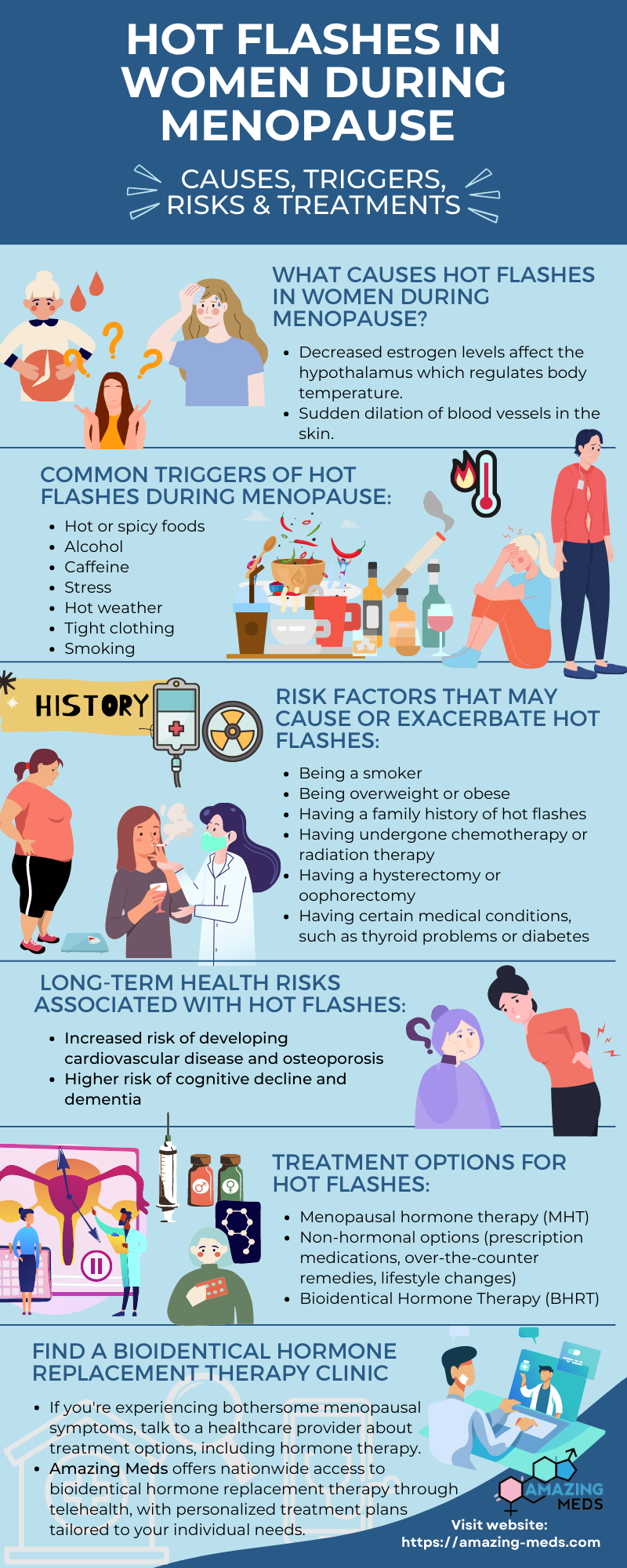Hot flashes are a common symptom experienced by women going through menopause, but they can also affect men and women who have undergone certain medical treatments or have certain medical conditions. While hot flashes can be uncomfortable and disruptive to daily life, there are various coping strategies and treatments available to manage the symptoms.
On this page, we will explore the causes of hot flashes, common triggers, practical coping strategies, and treatment options such as hormone replacement therapy. We’ll also answer some frequently asked questions about hot flashes to provide you with a comprehensive understanding of this symptom and its management.
Are Hot Flashes Normal During Menopause?
Yes, hot flashes are a normal and common symptom of menopause. According to the North American Menopause Society, up to 75% of women experience hot flashes during perimenopause and menopause. Hot flashes typically occur when a woman’s estrogen levels decrease, which can cause changes in the hypothalamus, a part of the brain that regulates body temperature.
At What Age Do Hot Flashes Generally Start?
Hot flashes can start during perimenopause, which is the period of time leading up to menopause when a woman’s ovaries begin to produce less estrogen. Perimenopause can start in a woman’s 30s or early 40s, but hot flashes typically start during menopause, which is defined as the point in time when a woman has gone 12 consecutive months without a menstrual period. Menopause usually occurs between the ages of 40 and 55.
How Long Do Hot Flashes Last?
The duration of hot flashes varies from woman to woman. Some women may experience them for just a few months, while others may have them for several years. The average duration of hot flashes is around 7 years.
What Causes Hot Flashes in the Context of Menopause?
Hot flashes occur when there is a sudden dilation of blood vessels in the skin, which causes an increase in blood flow and a sudden sensation of heat. This is believed to be caused by changes in the hypothalamus, which is responsible for regulating body temperature. During menopause, when estrogen levels decline, the hypothalamus may become more sensitive to changes in body temperature, leading to hot flashes.
What Are Common Triggers of Hot Flashes During Menopause?
While the exact cause of hot flashes is not fully understood, certain triggers are known to make them more likely to occur. Common triggers include:
- Hot or spicy foods
- Alcohol
- Caffeine
- Stress
- Hot weather
- Tight clothing
- Smoking
What Are Risk Factors That May Cause or Exacerbate Hot Flashes?
Several factors may increase a woman’s risk of experiencing hot flashes, including:
- Being a smoker
- Being overweight or obese
- Having a family history of hot flashes
- Having undergone chemotherapy or radiation therapy
- Having a hysterectomy or oophorectomy (surgical removal of the ovaries)
- Having certain medical conditions, such as thyroid problems or diabetes
Should I Worry About Hot Flashes?
Yes, hot flashes can have a significant impact on a woman’s quality of life, but they can also have long-term health risks. Here are two reasons why:
- Hot Flashes Impact a Woman’s Quality of Life
Hot flashes can disrupt sleep, making it difficult to get a good night’s rest. This can lead to fatigue, irritability, and difficulty concentrating during the day. Hot flashes can also cause embarrassment and anxiety in social situations, which can lead to a decrease in a woman’s overall quality of life.
- Hot Flashes Can Have Long Term Health Risks
Research has shown that women who experience hot flashes may be at an increased risk of developing cardiovascular disease and osteoporosis. Hot flashes may also be associated with a higher risk of cognitive decline and dementia.
How Can I Get Rid of Hot Flashes?
Hot flashes are a common and uncomfortable symptom of menopause, but there are treatments available that can help alleviate them. One option is menopausal hormone therapy (MHT), which involves taking estrogen and sometimes progesterone to replace the hormones that the body stops producing during menopause.
Menopausal Hormone Therapy
MHT can be an effective treatment for hot flashes, but it’s important to discuss the potential benefits and risks with your healthcare provider before starting this treatment. While MHT can help alleviate hot flashes, it may also increase the risk of certain health conditions, such as breast cancer, blood clots, and stroke. Additionally, MHT is not recommended for women who have a history of these conditions, and it may not be suitable for women who have certain medical conditions, such as liver disease or certain types of cancer.
Non-Hormonal Options
There are also non-hormonal treatment options available that can help alleviate hot flashes. These include prescription medications, such as antidepressants, and over-the-counter remedies, such as black cohosh and soy supplements. Lifestyle changes, such as avoiding triggers, staying cool, and practicing relaxation techniques, may also help alleviate hot flashes.
Why Bioidentical Hormone Therapy Is the Best Treatment Option
Bioidentical hormone therapy (BHRT) is a type of MHT that uses hormones that are identical in molecular structure to the hormones produced by the human body. BHRT is believed to be a safer and more effective alternative to traditional MHT because it uses hormones that are identical to those naturally produced by the body, and because the dosage can be customized to each individual patient’s needs.
When and Where Should I See a Doctor About Hormone Therapy?
If you are experiencing bothersome hot flashes and other menopausal symptoms, it is important to talk to a healthcare provider about the various treatment options available, including hormone therapy. Your medical practitioner can help you determine if hormone therapy is right for you based on your symptoms, health history, and other factors.
It is important to find a provider who is experienced in treating menopause symptoms and is up-to-date on the latest treatment options. Some women may prefer to see a specialist such as a gynecologist or endocrinologist, while others may choose to consult with a nurse practitioner or physician assistant.
Amazing Meds: Nationwide Provider of Bioidentical HRT via Telehealth
At Amazing Meds, we specialize in treating menopause symptoms, including hot flashes, with bioidentical hormone replacement therapy (HRT). Bioidentical hormones are designed to be identical in molecular structure to the hormones produced by a woman’s body. This allows for more natural hormone replacement, which can lead to improved symptom relief and fewer side effects.
Our team of experienced medical practitioners can provide personalized treatment plans tailored to your individual needs. We offer nationwide access to bioidentical HRT through telehealth, making it convenient for women to receive treatment from the comfort of their own homes.
Our telehealth services include remote consultations, health assessments, and more. The process is easy to follow. First, get to know you through a comprehensive health history evaluation. By learning about your concerns and goals for treatment, we’ll be able to create your custom care plan.
Next, your provider will assist you in scheduling a physical evaluation and any necessary lab work. After your evaluation, you will be connected with a member of our team to review the results of your lab work and physical.
Finally, our specialists will use that information to develop your personalized program for treatment. Everything you need will be mailed directly to your door, including medications, instructions, guidance, and access to continued support.
We encourage you to contact us and get connected to the care you need from the comfort of your own home. Our online HRT page provides more information about our telehealth services and how to become a patient. We believe that everyone deserves access to quality healthcare, and we’re here to make it easy for you.
To learn more about our Online HRT process, simply visit this page: https://amazing-meds.com/online-hrt-clinic/
Frequently Asked Questions
Can hot flashes continue after menopause?
Hot flashes can occur even after menopause, although they may decrease in frequency and intensity over time.
What causes hot flashes after menopause is over?
The exact cause of hot flashes after menopause is not known, but it is believed to be related to changes in hormone levels and fluctuations in the body’s thermostat.
What causes hot flashes besides menopause?
Hot flashes can also be caused by certain medical conditions, medications, and lifestyle factors such as stress, caffeine, and smoking.
Why do certain women experience hot flashes while others don’t?
The reason’s vary based on the individual, but it may be related to differences in hormone levels, genetics, and other factors.
Can foods or lifestyle factors trigger hot flashes?
Yes, certain foods and lifestyle factors such as spicy foods, caffeine, alcohol, smoking, and stress can trigger or worsen hot flashes.
Can alcohol cause hot flashes in menopause?
Yes, alcohol can cause hot flashes in menopause by dilating blood vessels and increasing body temperature.
Can sugar cause hot flashes in menopause?
While sugar itself may not directly cause hot flashes, it can lead to fluctuations in blood sugar levels that may trigger or worsen hot flashes.
Can chocolate cause hot flashes in menopause?
Chocolate contains caffeine, which can trigger or worsen hot flashes in some women.
Can spicy foods cause hot flashes in menopause?
Yes, spicy foods can trigger or worsen hot flashes by increasing body temperature.
What are practical coping strategies for managing hot flashes?
Some practical strategies for managing hot flashes include wearing breathable clothing, avoiding triggers such as caffeine and alcohol, practicing stress-reducing activities like yoga and meditation, and considering hormone replacement therapy (HRT) options with a medical professional.
Contact Our Hormone Therapy Clinic
If you are interested in learning more about bioidentical hormone replacement therapy and how it can help relieve your menopause symptoms, we invite you to contact our medical team. During your consultation, we will discuss your symptoms, health history, and treatment options to help you make an informed decision about your care. Contact us here.

